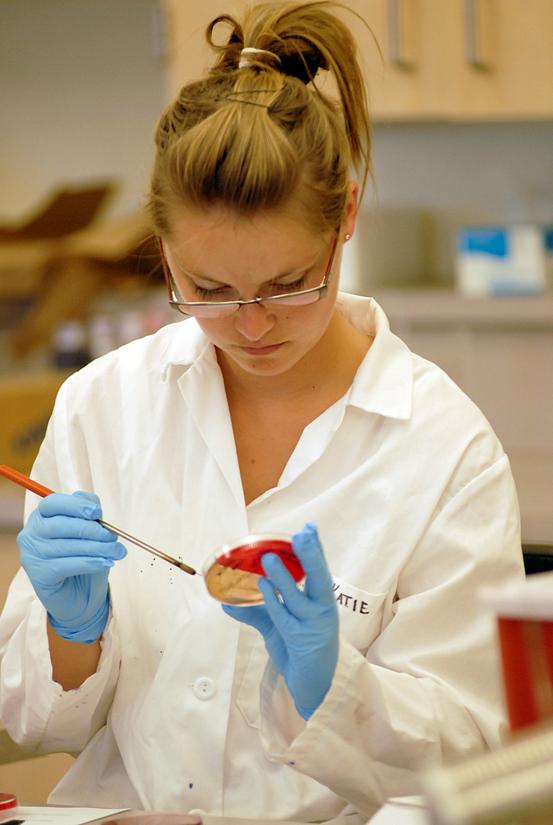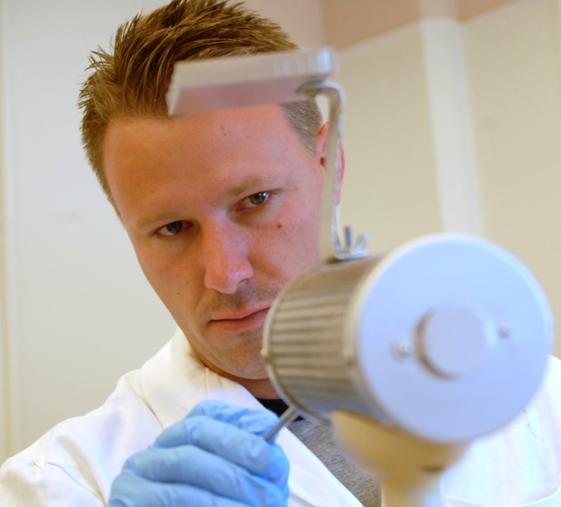Medical Laboratory Option
 What is the Medical Laboratory Science option in the Department of Microbiology and
Immunology?
What is the Medical Laboratory Science option in the Department of Microbiology and
Immunology?
This option is for students interested in careers that involve the performance of medical laboratory tests. These tests provide data that are used in the diagnosis and treatment of disease. Because their work may deal with life and death situations, it requires people who are precise, dependable and have a strong sense of responsibility. To become a Medical Laboratory Scientist, students must train in a year long program and become accomplished professionals in microbiology, chemistry blood banking and hematology. They are involved in a constant challenge of change, discovery and exploration and have a strong desire to help others.
What courses would I take in the MLS curriculum?
There are two plans to choose from in this option: Plan A and Plan B. In both plans, students get a strong background in microbiology, cell biology, chemistry and physiology. Specialty courses are offered in general microbiology, medical bacteriology, hematology, toxicology, virology, immunology, eukaryotic pathogens, microbial physiology, and genetics.
Plan A (3+1)
Students complete three years of coursework at MSU. Students apply to a program and if accepted, enter clinical training in their senior year. This clinical training for Plan A students is offered through the following affiliate schools:
- Montana Medical Laboratory Science Professional Program (MMLS), MSU, Bozeman, MT.
Students apply to these programs in their junior year. They must have a 2.5 GPA to apply. If accepted, students attend the program for one full year (3 semesters). Following successful completion of the training, students are awarded a Bachelor of Science degree from MSU and become eligible to take a certification exam to become Medical Laboratory Scientists.
Plan B (4+1)

Students take four years of coursework at MSU to complete the Bachelor of Science degree. If students apply to a program and are accepted, they enter their professional training in their fifth year (4 + 1). Students can apply for clinical training during their senior year. Programs are associated with many universities and hospitals in the United States. They are typically a full year in length and require at least a 2.5 GPA. After successful completion of this clinical training and a certification examination, they become registered Medical Laboratory Scientists.
How does the Medical Laboratory Science option prepare me for more advanced training and employment?
Professionals in this field are termed Medical Laboratory Scientists. In either plan A or plan B, students take a certification exam, either administered by the American Society for Clinical Pathologists (ASCP- BOC) or the American Medical Technologists (AMT). This certifies them to work in clinical labs throughout the nation.
Medical Laboratory Scientists have diverse career opportunities available to them, and they can combine skills and interests to create a career suited to their desired goals. Most medical laboratory professionals work in hospital laboratories, but many others are employed in clinics, physicians’ offices, commercial laboratories, research facilities, veterinary clinics, public health centers, criminology laboratories, the Armed Forces, and the Peace Corps. Some technologists with managerial background become laboratory administrators or marketing specialists with medical supply companies who are developing new test kits, instruments and equipment for diagnostic use. Some also apply their investigative skills to medical research, working closely with pathologists or other scientists.
Medical Laboratory Science Option A
Medical Laboratory Science Option B

